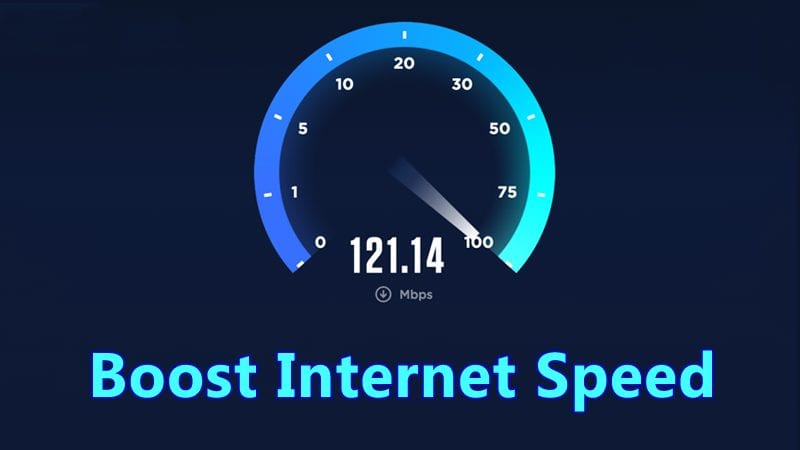In today’s digital age, a fast and reliable internet connection is essential for seamless online activities, whether you’re streaming movies, gaming, or working remotely. However, various factors can contribute to slow internet speeds, leading to frustration and hampering productivity. This article aims to provide you with effective strategies and practical tips to help you increase your internet speed, ensuring a smooth and enjoyable online experience.
Understanding Internet Speed
Before diving into the solutions, it’s crucial to understand the factors that affect your internet speed:
- Bandwidth: The amount of data that can be transferred over your internet connection per second, measured in megabits per second (Mbps) or gigabits per second (Gbps).
- Latency: The time it takes for data to travel from your device to the internet server and back, measured in milliseconds (ms).
- Network Congestion: When too many devices are using the same network simultaneously, causing slowdowns and bottlenecks.
- Distance from the Internet Service Provider (ISP): The farther you are from your ISP’s infrastructure, the slower your connection might be.
Optimize Your Router
Your router plays a crucial role in determining your internet speed. Here are some steps you can take to optimize your router:
- Update Router Firmware: Manufacturers regularly release firmware updates that can improve performance, fix bugs, and enhance security. Check your router’s manufacturer website for the latest updates and follow the instructions for installation.
- Change Channel: If you’re using a wireless connection, your router’s channel might be overcrowded or experiencing interference from neighboring networks. Use a Wi-Fi analyzer tool to find the least congested channel and change your router’s settings accordingly.
- Reposition Your Router: The placement of your router can significantly impact signal strength and coverage. Position your router in a central location, away from obstacles like walls and electronics that can cause interference.
- Enable Quality of Service (QoS): QoS prioritizes bandwidth allocation for critical applications or devices, ensuring smooth performance during periods of high network traffic.
Streamline Your Network
Optimizing your network can help eliminate bottlenecks and improve overall internet speed:
- Use Wired Connections: Whenever possible, use an Ethernet cable to connect your devices directly to the router. Wired connections are generally more stable and faster than wireless connections.
- Upgrade Network Components: If your network components (routers, switches, cables) are outdated, consider upgrading to newer models that support higher speeds and improved performance.
- Disable Bandwidth-Hogging Applications: Identify and close applications or services that consume excessive bandwidth, such as automatic updates, torrent clients, or cloud syncing services, when not in use.
- Scan for Malware: Malware can slow down your internet connection by consuming bandwidth or causing system instability. Run regular malware scans and keep your antivirus software up to date.
Optimize Your Browser and Computer
Your web browser and computer settings can also impact your internet speed:
- Clear Browser Cache and Cookies: Over time, your browser’s cache and cookies can accumulate, slowing down web page loading times. Regularly clear your browser’s cache and cookies to free up space and improve performance.
- Disable Browser Extensions and Plugins: Browser extensions and plugins can consume system resources and slow down your browsing experience. Disable or remove any unnecessary extensions or plugins.
- Close Unused Programs and Tabs: Running too many programs or having multiple browser tabs open can strain your computer’s resources, leading to slower internet speeds. Close any unused programs or browser tabs to free up memory and processing power.
- Update Your Software: Keeping your operating system, web browser, and other software up to date can help address security vulnerabilities and performance issues that might be affecting your internet speed.
Consider Upgrading Your Internet Plan
If you’ve tried all the above steps and your internet speed is still unsatisfactory, it might be time to consider upgrading your internet plan with your ISP. Higher-tier plans typically offer faster speeds and better performance, ensuring a smoother online experience for bandwidth-intensive activities like video conferencing, online gaming, or large file transfers.
Key Takeaways
- Optimize your router by updating firmware, changing channels, and enabling QoS.
- Streamline your network by using wired connections, upgrading components, and disabling bandwidth-hogging applications.
- Optimize your browser and computer by clearing cache and cookies, disabling extensions, closing unused programs, and updating software.
- Consider upgrading your internet plan with your ISP for higher speeds and better performance.
Conclusion
Increasing your internet speed requires a combination of strategies, from optimizing your router and network to streamlining your computer and browser settings. By following the tips and techniques outlined in this article, you can unlock the full potential of your internet connection, ensuring a smooth and enjoyable online experience. Remember, regularly maintaining and updating your network components and software can also contribute to sustained internet speed and performance.
FAQs
- What is a good internet speed for streaming?
For smooth streaming of high-definition (HD) video content, an internet speed of at least 5 Mbps is recommended. However, for ultra-high-definition (4K) streaming, you’ll need a faster connection, typically 25 Mbps or higher.
- How can I test my internet speed?
You can use online speed test tools like Speedtest.net, Fast.com, or the speed test provided by your ISP. These tools measure your download and upload speeds, as well as your latency (ping).
- Can a VPN affect my internet speed?
Yes, using a virtual private network (VPN) can sometimes slow down your internet speed, as your data needs to travel through an additional server. However, reputable VPN providers often have optimized servers and protocols to minimize speed loss.
- How often should I reboot my router?
It’s generally a good practice to reboot your router every few months. Rebooting can help clear the router’s memory, resolve connectivity issues, and potentially improve performance.
- Can too many devices on my network slow down my internet?
Yes, having too many devices connected to your network can lead to network congestion and slower internet speeds. Consider limiting the number of connected devices or upgrading your internet plan to accommodate your household’s needs.
- Can my internet speed be affected by the time of day?
Yes, internet speeds can fluctuate based on peak usage times, typically in the evenings or weekends when more people are online and consuming bandwidth.
- How can I check for interference affecting my Wi-Fi signal?
You can use a Wi-Fi analyzer app or tool to scan for potential sources of interference, such as nearby wireless networks, microwaves, or other electronic devices operating on the same frequency.
- Can my internet speed be affected by the distance from the router?
Yes, the further you are from your router, the weaker the Wi-Fi signal becomes, which can result in slower internet speeds. Consider placing your router in a central location or using a Wi-Fi extender to improve coverage.
- Should I enable QoS on my router?
Enabling Quality of Service (QoS) on your router can help prioritize bandwidth for critical applications or devices, ensuring a smoother online experience during periods of high network traffic.
- How often should I update my router’s firmware?
It’s recommended to check for and install router firmware updates as soon as they become available from the manufacturer. These updates often include performance improvements, bug fixes, and security patches.
- Can my internet speed be affected by the type of wiring in my home?
Yes, outdated or poor-quality wiring in your home can contribute to slower internet speeds, especially for wired connections. Consider upgrading to modern wiring standards, such as Category 6 (Cat6) Ethernet cables.
- What is the difference between download and upload speed?
Download speed refers to the rate at which data is transferred from the internet to your device, while upload speed is the rate at which data is transferred from your device to the internet. Most internet plans offer faster download speeds compared to upload speeds.
- Can a virus or malware affect my internet speed?
Yes, malware or viruses can consume system resources, hog bandwidth, or cause instability, leading to slower internet speeds. Regularly scan your devices for malware and keep your antivirus software up to date.
- Should I use a wired or wireless connection for faster internet?
Wired Ethernet connections are generally faster and more reliable than wireless (Wi-Fi) connections. However, wireless connections offer greater flexibility and convenience.
- Can weather conditions affect my internet speed?
In some cases, extreme weather conditions, such as heavy rain or thunderstorms, can temporarily disrupt internet connectivity and potentially slow down speeds.
- How can I prioritize bandwidth for specific applications or devices?
Most modern routers offer Quality of Service (QoS) settings that allow you to prioritize bandwidth allocation for specific applications or devices, ensuring they receive the necessary bandwidth for optimal performance.
- Can my internet speed be affected by the number of browser tabs or applications running?
Yes, having too many browser tabs or applications running simultaneously can consume system resources and potentially slow down your internet connection.
- What is network congestion, and how can it affect my internet speed?
Network congestion occurs when too many devices or users are trying to access the internet simultaneously, resulting in slower speeds and potential bottlenecks. This is more common during peak usage hours or when there are bandwidth-intensive activities occurring on the network.
- Can my internet speed be affected by the age of my router or modem?
Yes, older routers or modems may not be able to take full advantage of the latest internet technologies and speeds offered by your ISP. Upgrading to newer models can potentially improve your internet performance.
- Should I use a Wi-Fi extender or mesh network to improve my internet coverage?
If you’re experiencing poor Wi-Fi coverage or signal strength in certain areas of your home or office, using a Wi-Fi extender or implementing a mesh network can help extend the wireless coverage and improve internet speeds in those areas.

